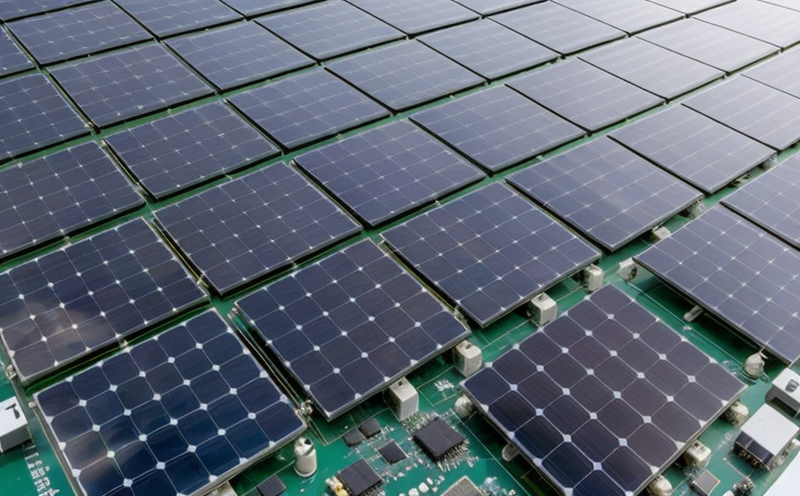EN 50530 Efficiency Testing for Photovoltaic Inverters
The EN 50530 standard is a critical benchmark for ensuring the efficiency, safety, and reliability of photovoltaic (PV) inverters. This standard sets out comprehensive testing protocols designed to evaluate the performance parameters that are essential in optimizing solar energy conversion into usable electricity. The primary focus areas include maximum power point tracking (MPPT), AC output voltage, current, and harmonic distortion, which together contribute significantly to the overall efficiency of PV systems.
The EN 50530 testing protocol is not just a compliance requirement; it is an industry best practice that helps manufacturers improve their products. By adhering strictly to these standards, companies can ensure that their inverters meet or exceed international quality benchmarks, thereby enhancing market credibility and customer trust. This testing ensures that the inverters operate efficiently under various environmental conditions such as temperature variations, irradiance levels, and load changes.
The process involves detailed specimen preparation, where each inverter is subjected to a series of stress tests to simulate real-world operating conditions. The instrumentation used includes precision measurement tools capable of capturing minute differences in power output, voltage regulation, and harmonic distortion levels. These measurements are then analyzed against the stringent acceptance criteria defined by EN 50530.
The importance of this testing cannot be overstated. Inefficiencies in PV inverters can lead to significant financial losses for both manufacturers and consumers due to higher electricity costs or reduced energy yield. Moreover, failing to meet these standards can result in product recalls, legal disputes, and reputational damage. By investing in rigorous EN 50530 compliance testing, companies can preemptively address potential issues, ensuring that their products perform optimally under all conditions.
Compliance with this standard is mandatory for any PV inverter intended for commercial or industrial use within the European Union. It ensures interoperability and reliability across diverse environments, making it a cornerstone of modern solar energy systems. The standards are regularly updated to incorporate advancements in technology and environmental considerations, further emphasizing their relevance and importance.
Why It Matters
The significance of EN 50530 efficiency testing extends beyond mere compliance. It plays a pivotal role in enhancing the overall performance and longevity of photovoltaic inverters, which are central components in solar power generation systems. By adhering to these stringent standards, manufacturers can ensure that their products not only meet but exceed global expectations for efficiency and reliability.
From an economic perspective, efficient PV inverters translate into lower operating costs for end-users by maximizing energy conversion rates. This is particularly beneficial in remote or off-grid locations where every kilowatt-hour counts. Additionally, compliance with EN 50530 can open up new market opportunities, as it demonstrates a commitment to quality and sustainability that resonates well with eco-conscious consumers.
Environmentally, the benefits are equally pronounced. Inverters tested against these standards contribute to reducing greenhouse gas emissions by optimizing energy use. This aligns perfectly with global efforts towards sustainable development goals. Moreover, efficient inverters can help in extending the lifespan of solar panels and other renewable energy components, thereby promoting a circular economy.
For R&D engineers and quality managers, EN 50530 provides a robust framework for innovation and continuous improvement. It acts as a benchmark against which new designs and technologies are evaluated, ensuring that advancements do not compromise on fundamental performance metrics. This standard also facilitates better collaboration between different stakeholders within the solar industry, fostering an environment of shared knowledge and best practices.
Competitive Advantage and Market Impact
The adoption of EN 50530 efficiency testing offers several competitive advantages for manufacturers operating in the renewable energy sector. Compliance with these standards not only ensures product reliability but also positions companies as leaders in innovation and sustainability. This enhances brand reputation, which is crucial in attracting both domestic and international clients.
From a market perspective, adhering to EN 50530 can significantly impact business growth and profitability. It signals to potential customers that the company prioritizes quality above all else, thereby building trust and loyalty. This trust translates into repeat purchases and favorable word-of-mouth recommendations, both of which are invaluable assets in competitive markets.
Moreover, compliance with these standards is a prerequisite for accessing certain government incentives and subsidies aimed at promoting renewable energy technologies. For instance, manufacturers who pass EN 50530 tests may be eligible for tax credits or grants, providing a financial boost that can further enhance profitability. This not only supports individual businesses but also contributes to the broader goal of accelerating the transition towards sustainable energy sources.
The standard's influence extends beyond individual companies; it shapes industry norms and practices, driving collective progress. By setting high benchmarks for efficiency testing, EN 50530 encourages continuous improvement across the entire sector. This collaborative approach fosters innovation and ensures that all participants are aligned with global sustainability goals.
Use Cases and Application Examples
| Use Case | Description |
|---|---|
| Data Center Inverters | Testing inverters used in data centers to ensure they operate efficiently under high-density power requirements. |
| Off-Grid Systems | Evaluating inverters for standalone solar systems in remote locations where grid connectivity is limited or non-existent. |
| Commercial Rooftop Installations | Ensuring inverters used in commercial buildings meet strict efficiency standards to optimize energy savings. |
| Residential Solar Panels | Testing residential solar panels to ensure they integrate seamlessly with efficient inverters for home use. |
- Industrial applications where high reliability is paramount, such as in manufacturing plants or large-scale farms.
- Remote areas requiring reliable energy solutions, like rural communities and isolated infrastructure projects.
- Green initiatives aimed at reducing carbon footprints, such as government-backed renewable energy projects.
The versatility of EN 50530 testing allows for its application across a wide range of scenarios. Whether it's in large-scale industrial operations or small residential setups, the standard ensures that PV inverters perform reliably and efficiently under diverse conditions.





